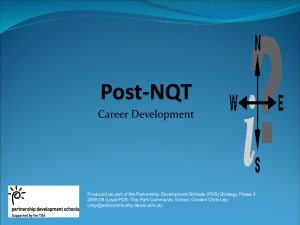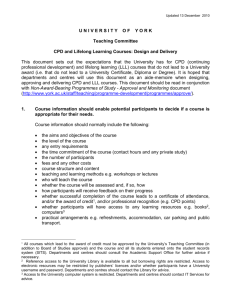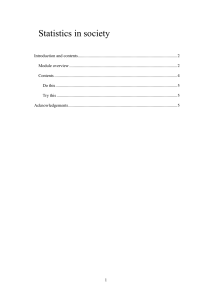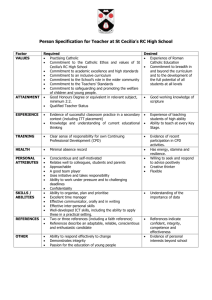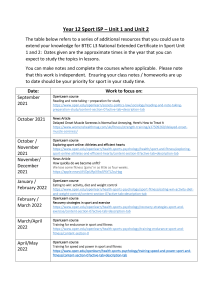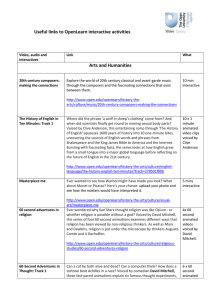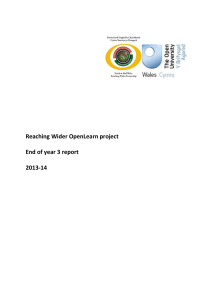Presentation: The Open University
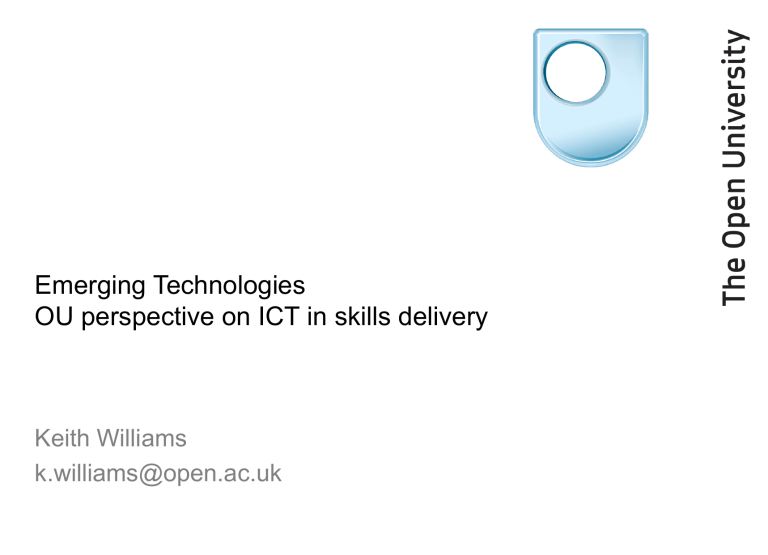
Emerging Technologies
OU perspective on ICT in skills delivery
Keith Williams k.williams@open.ac.uk
The Open University in 2010
• At 40+ officially middle aged
• Over 2 million students since 1971
• 200,000+ students each year
• 40,000 outside UK
• Network of over 300 UK study centres
• Part-time remote learners – modules:
10 –15 hours a week for 32 weeks
UK four nations presence
• The University is funded in England and NI, Wales and Scotland
– centres in each nation plus 10 English regions.
– staffed by Director, student support and administrative staff
• Staff in these centres are responsible for:
– the practical support and advising of students: learning advisors, tutors
– the recruitment, training and supervision of
8,000 part-time Associate Lecturers (ALs)
– face-to-face tutorials, residential schools, examinations and events
The Open University in 2010
• Distributed institution built on scaleability
• Changed Student Socio Demographic context
• Technological Legacy
• Changing markets, Changing competition
Scaleability in the OU
Media Design
+
Production
Admin
Syst
Central Faculty
Reg
Acad
Design and develop course, set assessments exam and marking schemes x20
Recruit, develop and performance monitor tutors x75
Tutor Team
Teach, support and assess students to standard procedures x20
Student
Distributed students study to same pattern and standards
Total 30,000 per faculty
Scaleability – Mega-universities
• Mega Universities
– Sir John Daniel circa ’95
– Institutions teaching 100,000+
– Invest heavily in
• Content Development
• Administrative Systems
• Distribution and Logistics
– Scaleability delivers high quality at low cost per individual
– Industrial scale teaching
Cost
Conventional
Distance
Learning
Student Number
Changed Context and Markets
• Does the mass market still exist?
• Increased participation in
HE reduces market for 2 nd chancers
• Increased participation in
HE increases market for graduate lifelong learners
Cost
Conventional
Distance
Learning
Student Number
Changing Technologies
• E technologies reduce costs of
– Content Development
– Administrative Systems
– Distribution and
Logistics
• Cross over point at lower student numbers
• Convergence of
Conventional and Distance
Learning
Cost
Conventional
Distance
Learning
Student Number
Milestones to convergence ?
Systems stable
DL text led
1 st online conferencing
Conv classroom led, some video classroom outreach
1 st standalone in OU course
WWW
PC use in OU course raises profile of text resources
1 st Fully online OU course
Intro to
WWW
11,000 studs pa
MIT
Open courseware launched
Distribution of course materials PDFs, quizes etc via VLEs reduces barriers of entry to distance learning for conventional univs
OU selects
Moodle
VLE
Openlearn
Facebook i-Tunes
U
1985 1990 1995
2000 2005
OU technology policy
The Vision:
We lead the learning revolution taking innovation to the heart of learning and research.
We continuously seek new and better ways to inspire and enable learning.
The reality:
Knowledge Media Institute and Institute of Educational Technology lead technological and pedagogic research.
Mainstream teaching exploits stable, domestically available technologies.
Dimensions of flexibility
Time
-ve
Place
Classroom teaching
+ve
Resources/Interactivity
What’s needed in the skills and
CPD market ?
• HEFCE funded study of market potential for online CPD
• Employer and Professional Body membership survey
– Small blocks of learning ( 20-30 hours max 2-3 credit)
– Rapid availability, flexible study time
– Work relevant and instantly applicable
– Credit not essential but a nice to have extra
– Acceptance of e-learning but limited experience
– Access to HE academic staff
Centre for Professional Learning and Development
• Seeks to meet employer demand for both generic and custom programmes exploiting
• OU course inventory
• OU systems
• OU networks
Who for?
Practising professionals wishing to extend and update their skills with quality CPD
Members of professional bodies that require CPD evidence
Promotion/job seekers who want to prove their
CPD
Alumni who want postqualification career-long learning
Staff in organisations which are pursuing organisational development
Practising professionals wishing to extend and update their skills with quality CPD
Challenges
Flexibility and availability
Short online modules
Relevance
Work based context and activities
Scalability
Scale up and down
Continuity
Routes to credit and qualification
Skills Coverage
• Leadership Skills
• People Management
• Project and Programme
Management Skills
• Analysis and Use of
Evidence
• Financial Management
Skills
• Strategic Thinking Skills
• Communications and
Marketing Skills
• Creative and Problem
Solving Skills
• Key Corporate Skills
• Change Management
Skills
• Ethical Practice Skills
• IT Skills
• Numeracy Skills
OU-Housing and Communities
Academy
Transfer of a face to face workshop based course to online environment
Five days of collaborative workshops to be replaced by 5 workplace based sessions supported by remote online facilitator
Desktop based conferencing
Using the commercial Elluminate system ,
•multiple participants,
•Audio, video and online chat channels
•whiteboards,
•application sharing,
•breakout rooms etc
OU-Housing and Communities
Academy
Trial with HCA and Stoke on Trent Council
Facilitator led sessions during working hours
Challenges: online use of rich picture techniques defaulted to text based post it techniques corporate firewalls advance planning and negotiation needed priority conflict if you’re in the office you can’t be on a course
The Executive Reading Group
90% of Professionals report “ Reading” as a Professional
Development activity
50% report use of internet for discussion with fellow professionals
Exec Reading Group based around “must read” books
University Guru led
Trialled using Elluminate system, synchronous discussion, whiteboard slides as scene setters
Flexible in direction, follow on via blog
Returns University to academic roots, students at the e-feet of the professor
Working with Employers and
SSCs
• IT Professional Development Programme working with e-skills and major employers
– 6 modules leading to PG Certificate
• Certificate of Nuclear Professionalism, working with
National Skills Academy –Nuclear and major employers
– 7 industry defined modules
– Accessed through company, university and other providers
– QCF registered qualification through OU Awarding
Body
Routes to Credit
Flexible user led development
Open Educational Resources
• OER movement provides flexible resources licenced under Creative Commons licencing to allow users to use, modify and share learning resources
• Open Learn
– http://www.open.ac.uk/openlearn
• i-Tunes U
– http://www.open.ac.uk/itunes/
Openlearn
Openlearn
Openlearn
Conclusions
• OU conservative but bold in its use of new technologies
• The principles of scaleability are under challenge
• Our resources and capable of supporting a range of novel skill development models
• We are a networked and networking institution.
• Innovation is in our life blood

